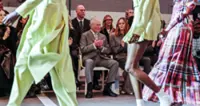Designer Ulla Johnson was thinking recently about what she would wear to vote Tuesday (Nov 5), what would convey how seriously she took the stakes in this election.
She was thinking, she said, about wearing a bow-tie blouse – maybe the crisp lemon yellow cut from her latest collection, tied with a flourish on the side of the neck.
She was seeing the style of top more and more, she said, since US vice president Kamala Harris wore two variations at the Democratic National Convention.
Perhaps, she said, the bow-tie blouse could become “a rallying cry”.
Clothes have not been an obvious strategic tool in this presidential race – not the way they were the last time former president Donald Trump ran against a woman, in 2016, when Hillary Clinton made the white suit the iconography of the opposition.
Harris has deliberately decentred identity politics in her campaign and deemphasised clothing that calls attention to her gender.
And yet despite it all, one garment – the pussy-bow blouse, or floppy-bow blouse or lavalliere blouse, depending on what you want to call it – has surfaced as a symbol of the moment, seeping into the general consciousness and becoming an unlikely form of self-expression.
As it has time and time again throughout history when issues of women’s rights and women’s power come to the fore.
More than any other piece of clothing that has represented the quest for gender equality, including the once radical notion of women in pants and the battering-ram shoulder pads of the C-suite revolution, the pussy-bow blouse has been a tool of covert sartorial diplomacy.
Feminine but not sexual, masculine but not threatening, it functions both as camouflage for women entering traditional male spaces, said Kate Strasdin, a fashion historian at Falmouth University in Cornwall, England, and as “a statement of intent”.
“It may be the most enduring symbol of female barrier-crossing we have,” she added.
Harris has worn bow blouses during her most consequential public moments in national politics.
In 2020, when she made her first speech as vice president-elect, she wore the blouse with a suffragist white suit, doubly underscoring the pioneering nature of her election.
And she has worn one three times since becoming the Democratic candidate for president: during the convention in August for each of her two onstage appearances, and in September, during her debate with Trump.
When Catherine, Princess of Wales, appeared for her first official public engagement last month after finishing her cancer treatment, she did so in a bow-tie shirtdress.
This fall, the bow blouse began to reappear on the runway (as did even more literal neckties).
There were long, streaming bows juxtaposed against polka-dot jackets at Carolina Herrera. There were bow blouses paired with argyle knits and wrap miniskirts at Prada.
At Balenciaga, bows adorned the necks of what appeared to be proper silk dresses from the front but turned out to be fully lingerie-laced at the back. Bows cascaded, ascot-like, down floral tops at Chanel.
They provided the time-traveling link between Renaissance jackets and bike shorts at Louis Vuitton.
And a bow blouse from Alessandro Michele’s first Valentino collection has pride of place in the window of the Valentino store on Madison Avenue in New York.
“It’s a very loaded garment,” said Paola Antonelli, a senior curator at the Museum of Modern Art. “A design object used to send a message.”
Read more: Want to learn how to dress like Donald Trump? Then you need to watch this film
Rise and fall, and rise again
According to Valerie Steele, director of the museum at the Fashion Institute of Technology, the female bow-tie blouse first appeared in the court of Louis XIV. The king’s mistress, Louise De La Valliere, created her own version of the frothy cravat then favoured by the (male) court.
She said that the Gibson Girls of the late 19th century and the New Women of the early 20th century started wearing bow tie-like bows around their necks when they began “to venture out unaccompanied”, whether to play classically masculine sports like golf or to go to work.
It was a way to “challenge the patriarchy without destabilising it”.
Certainly there was nothing threatening about the moniker “pussy bow”, as the garment became known in the 1930s because of its resemblance to the ribbons occasionally used to adorn pet kittens – even if, 30 years later, Yves Saint Laurent reclaimed the accessory by adding a pussy-bow tie to his first women’s tuxedo, connecting it once again to the concept of gender appropriation.
This notion became even more pronounced in the 1970s, when John Molloy wrote the book The Woman’s Dress For Success and recommended that women with executive ambitions adopt floppy bow ties as a feminised version of the necktie (see Jane Fonda in the 1980 film 9 To 5).
“It was a way to mediate between more masculine standards and the need to maintain a certain femininity,” Antonelli said.
The bow-tie blouse was a favourite look of Nancy Reagan’s during Ronald Reagan’s time in the White House.
Its most famous proponent, though, was Ronald Reagan’s peer Margaret Thatcher, who made the bow blouse part of her signature when she was British prime minister – in part, she said in a television interview in 1985, because it softened her image.
It became so associated with Thatcher and the Conservative Party that Samantha Cameron, then first lady of Britain, wore a pussy-bow blouse to the Iron Lady’s funeral in 2013.
And thus it was defined until 2016, when Melania Trump appeared at a debate wearing a hot pink pussy-bow blouse only days after her husband’s “grab ’em” comment became public.
Her choice was widely seen as an attempt by Melania to troll... somebody (the press, her husband – it was not entirely clear), and suddenly the formerly conservative shirt became a made-for-social media “symbol of irony”, Strasdin said.
Read more: Forget stuffy suits, fashion's officewear refresh is in the business of cool
‘Recognisable to everyone’
By 2022, when Kate Moss testified in the Johnny Depp-Amber Heard defamation trial in a polka-dot bow blouse and black jacket, the top had become “a palimpsest with layers of meaning,” Steele said, though it was, nevertheless, “recognizable to everyone.”
Which meant, said Wes Gordon, creative director of Carolina Herrera, that it was “a permanent part of the fashion vernacular”.
Which is why Harris’ decision to make the bow blouse (and its high-neck, draped cousin, which she also favours) part of her wardrobe is so resonant. The history of the blouse allows her to play to all sides of the aisle.
She can appeal to conservatives who associate the blouse with Thatcher and Reagan and see it as a reassuringly familiar female uniform.
She can situate herself in the long arc of tie-wearing presidents who came before, stretching back to the founding fathers, with their own frothy shirts. And she can wink at the opposition, which may see the sartorial choice as a subversive dig at her opponent.
Whether the blouse will blossom into a full-fledged symbol of the first female president hangs on what happens Tuesday (Nov 5).
But however the blouse is worn – tied in the traditional soft way or more voluminously – it always speaks to “the performance of power”, said Johnson, the designer.
“Which, when it comes to women, is still very, very complicated.”
After all, she continued, “It’s a real statement to wear a bow around one’s neck.” – ©2024 The New York Times Company





